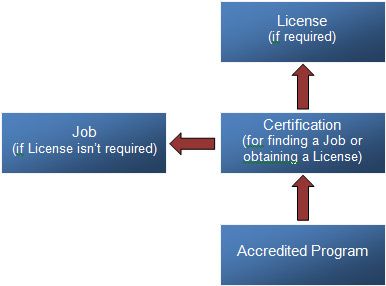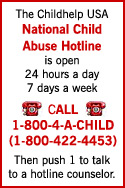 |
|
||||










Types of Education - Certification and Licensing
| This page merely provides an overview of the subject matter. To learn more, please visit the web sites found on the Resources page. |
Key Points
- Certification and licensing typically take place after receiving your education.
- A certification is a national, industry-recognized competency credential.
- A license is a legal credential, usually issued by a state.
- Having a key certification is a common requirement for obtaining a license.
- In some industries such as health care, automotive repair, and information technology, certification and licensing are vitally important.
- In other industries such as retail, certification and licensing play a minor role at best.
Certification
What Are Certifications?
A certification is a national, industry-recognized credential that verifies and documents your ability to perform a job. Certifications are issued by a wide variety of industry groups, associations, and other entities. For example, the Certified Public Accountant (CPA) certification is issued by the American Institute of CPAs (AICPA).
The requirements for attaining a certification vary widely, but common elements include:
- Passing a written or computer-based examination;
- Demonstrating capability, for example, fabricating a metal part;
- A specific amount of time working at that occupation.
Once you have earned a certification, the certifying organization will typically provide you with a physical credential such as a paper certificate, a wallet card, or a pocket patch. In addition, the organization will enter your certification status into a central electronic registry.
Certifications are voluntary and do not provide any legal basis for you to work at an occupation - that's the role of licensing. However, specific jobs may require you to be certified. For example, the human resources field as a whole does not require you to have a Senior Professional in Human Resources (SPHR) certification, but a specific employer/job may require this certification.
Which Certification(s) Should I Get?
First, you should determine that obtaining a certification is important for your chosen occupation; for many occupations, certification does not play a role. Once you know that certification is important, you should carefully research your chosen occupation. Why? Because among the many certifications associated with an occupation, there are usually only one or two key certifications - with the remainder falling in the "nice to have" category.
A certification can be a key certification for a couple of reasons:
- The certification is specifically required to obtain a license (see below), and/or
- Employers value the certification, and having the certification makes it easier to find a job.
By the way, there's nothing wrong with obtaining the "nice to have" certifications; just make sure you get the key certification first!
Unfortunately, the "certification finder" found at this site (on the Education page of an occupation) does not currently distinguish between the "nice to have" certifications and the key certification. Speaking of the certification finder...
Criteria for the Certification Finder
For a certification to be included in this search,
- It must require either education, training, work experience, or examination;
- It must not be a state-required license, although it may lead to a license; and
- It must provide a certification documenting level of education, training, work experience or passing an examination for that occupation or credential.
Certification information and certifications come from a variety of sources. Changes to existing certifications and the addition of new certifications are usually made because of research done by staff, partners, and affiliates or feedback gathered from users of our web products. This certification information is compiled and maintained by CareerOneStop.org and is exclusively available at the CareerOneStop site.(1)
Licensing
A license verifies and documents that you can legally work at a particular occupation. Obviously, not all occupations have licensing requirements, for example, requiring a license to change tires doesn't make much sense. However, many occupations, particularly those in health care, do require licenses.
Unlike certifications, licenses are issued by government entities (usually state governments). Each state uniquely defines, through statute and regulation, the mandatory and discretionary requirements for its licenses. Fortunately, many state-issued licenses are recognized by other states. For example, if you are licensed to work as a nurse in New York, the chances are good that you'll be able to work in other states as well.
What's the Relationship Between Certification and Licensing?
People often use the terms certification and licensing as if they are the same thing. They are definitely not the same thing, but they are related to one another.
How? Having a specific certification is a common requirement for obtaining a license. In some cases, this relationship is very strong, and the certification effectively becomes the "competency component" for the license.
Regardless of how competency is demonstrated (certification or as part of the actual licensing exam), it is not uncommon for a license to have a separate "non-competency" exam that focuses on issues such as ethics or the law.
Accredited Educational Programs and Certification/Licensing
In the image below, notice how an accredited program feeds into the certification. It is very common for a certification's or licence's requirements to explicitly state that you must be a graduate of an accredited program.

Even when certification is not part of the picture, the license itself will sometimes require that you be a graduate of an accredited program.
So, before enrolling in an educational program, take a very close look at the licensing and certification requirements for your chosen occupation/state, and if required, make sure your educational program is accredited!
Source(1): CareerOneStop.org
How Can I Find Educational Programs, Certifications and Apprenticeships?
Once you are on the Education page of a specific occupation, you will be able to search for educational programs, certifications, and apprenticeship sponsors related to that occupation.

| For help with federal employment and training programs call 1-877-US2-JOBS (1-877-872-5627) TTY 1-877-TTY-JOBS (1-877-887-5627) |








